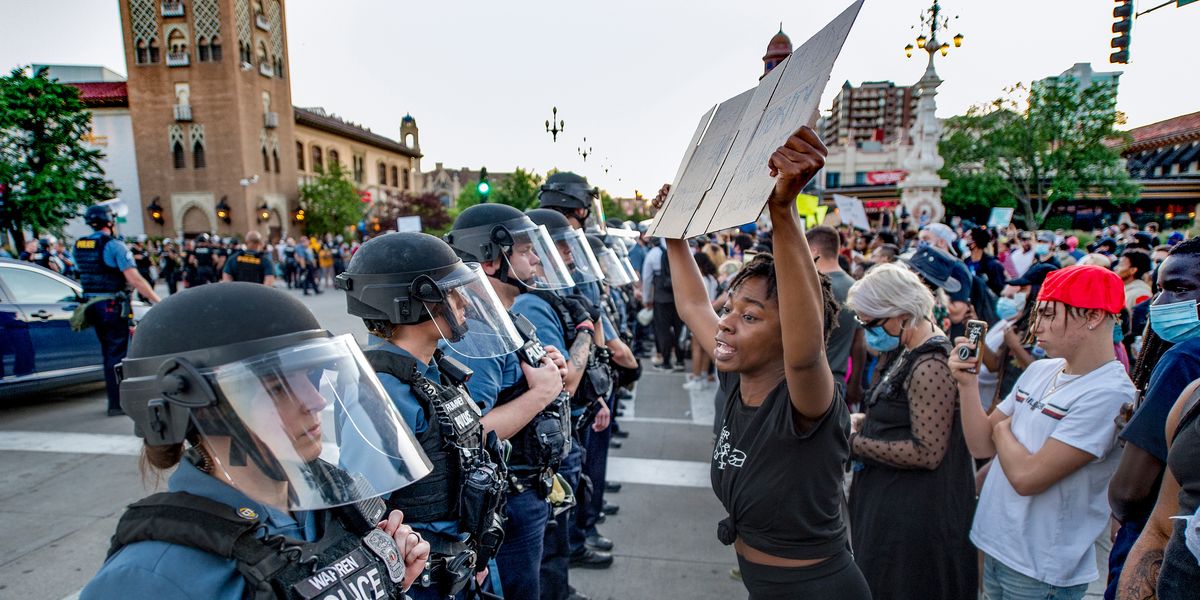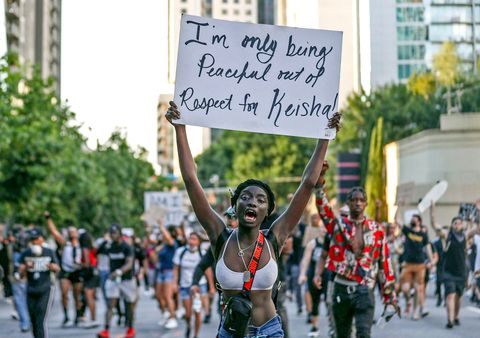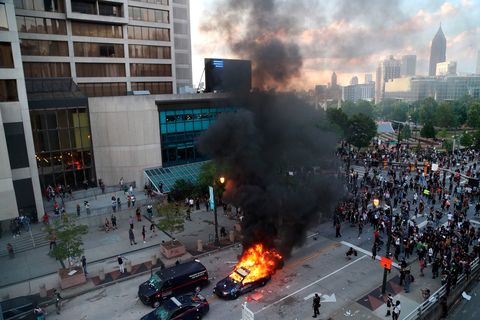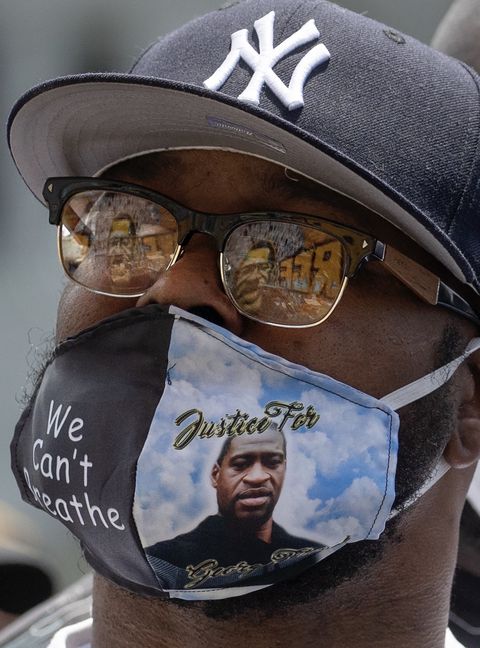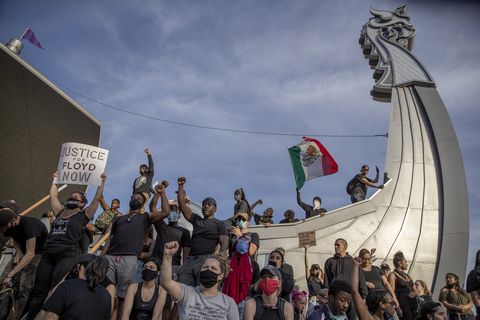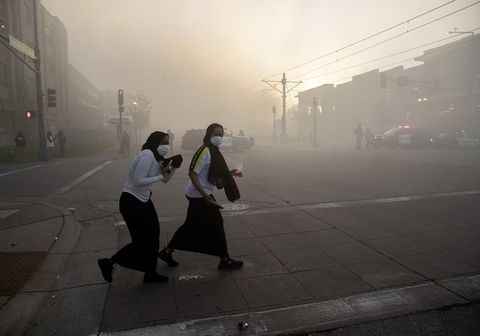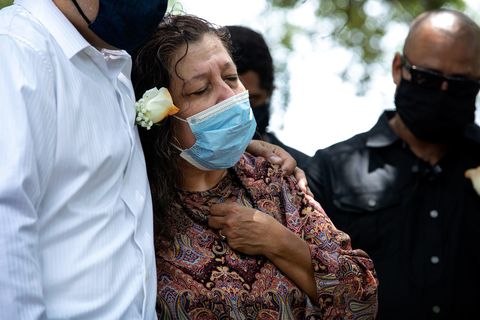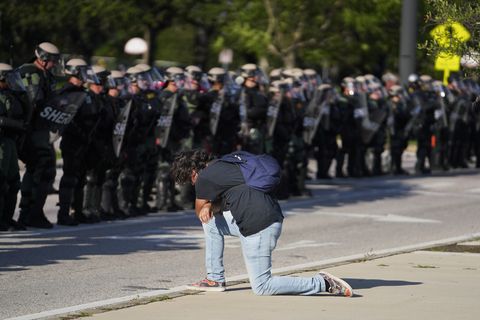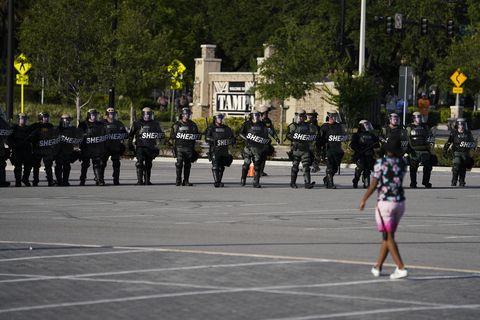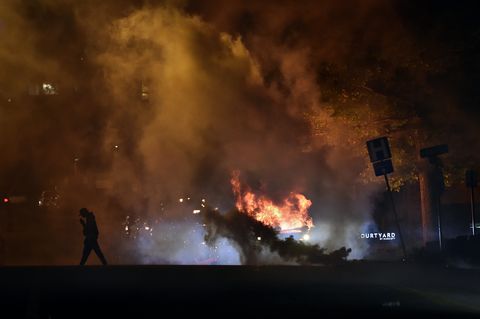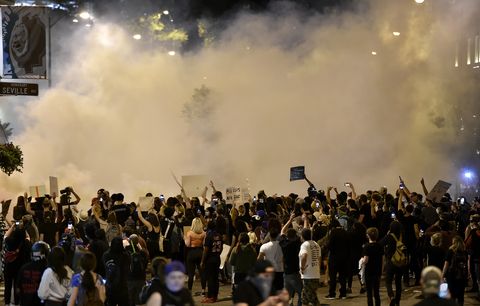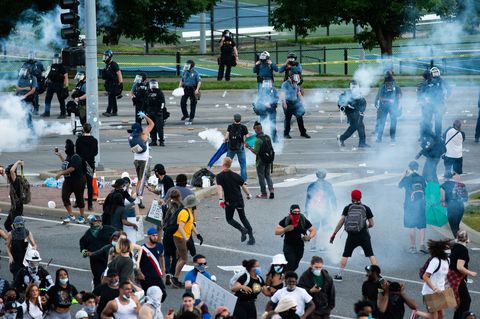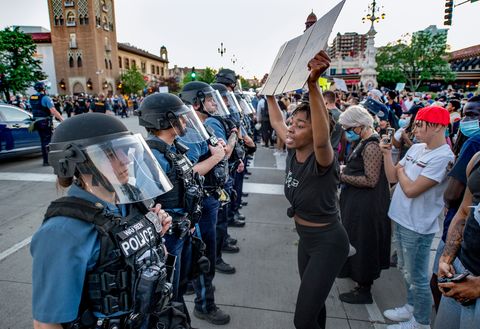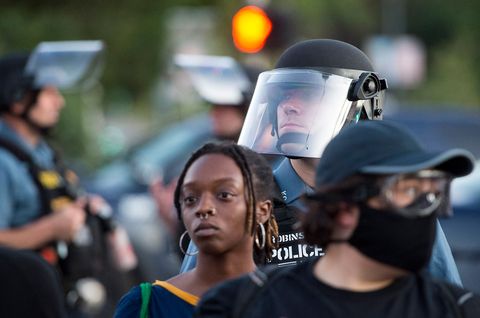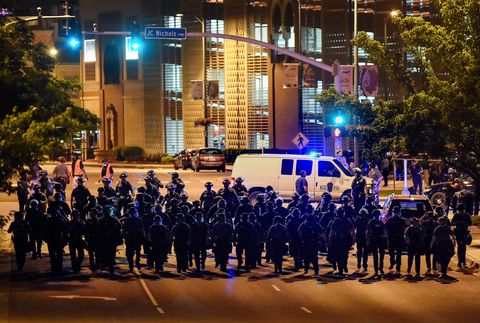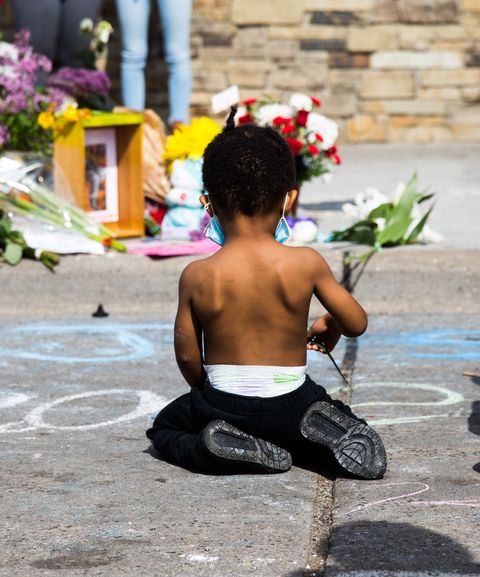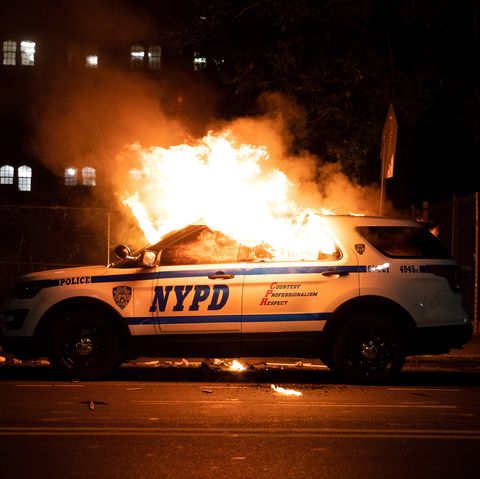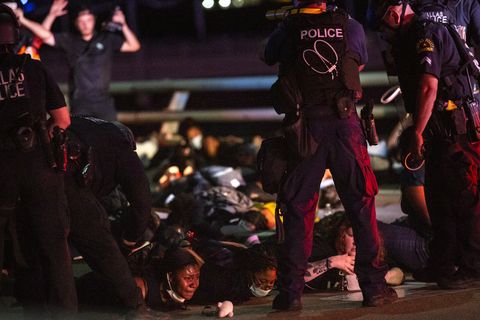They’ve been tear gassed, beaten with nightsticks, and thrown into jail by police while documenting the daily protests demanding justice for the murder of George Floyd, who died after a Minneapolis officer pinned him to the ground and pressed a knee into his neck. Still, photojournalists continue to risk their lives in the name of truth-telling—creating a permanent record for history by preserving this movement’s most powerful acts of triumph, hope, and heroism.
We spoke to nine female photographers from all over the country fighting off police rubber bullets to get the perfect shot.
Alyssa Pointer, Atlanta Journal-Constitution Staff Photographer
“It wasn’t the words on this woman’s sign that drew me, I didn’t even see the verbiage until hours later. What attracted me was the richness of her skin tone and her emotions. There is a thought in the African American community that women are the backbone of social justice movements. There is also an idea that African American women, especially of a darker hue, get the brunt of disrespect due to colorism. Not knowing this woman’s personal struggle, I used those two ideas to make this image. I wanted to document her passion in this historical moment, and I also wanted to show her beauty.
I was detained while covering protests the next day. I was photographing two women who were being detained for their actions, when I set my camera down. An officer from the Department of Natural Resources told me I was being arrested. I told him that I work for the local newspaper and was just doing my job. I had two cameras hanging from my sides. He said he didn’t care and then told a few other officers to put me in zip-tie cuffs. My badge was displayed on my chest and the other officers saw it. It wasn’t until two television photojournalists and a broadcast reporter spoke on my behalf, that I was released. The experience was frustrating, because it was like my word and my badge were meaningless to the detaining officer. I’m aware that being an African-American female staff-photojournalist for a newspaper is an anomaly, but we are here. It is imperative for police officers to listen to what we have to say and to check their preconceived notions as they interact with journalists of color.”
“I used a telephoto lens to take an image of the burning car and then got my wide angle lens out to make this picture. I got lucky that the sun was setting. I purposefully wanted to include the skyline, because I love Atlanta. I grew up in Jonesboro, Georgia, which is a suburb on the Southside of metro-Atlanta. My job is to document history and I wanted to make sure people could get a full scope of what happened that day. Before I took this image, I watched people hurl projectiles toward police officers with the purpose of breaking the windows and doors at the CNN Center. After I took this photo, I watched, again, as they destroyed the entrances to multiple businesses. I kept saying to myself, ‘What is the end goal here?’ And as other police vehicles were set ablaze, I got the answer, the end goal was destruction.”
Elizabeth Flores, Minneapolis Star Tribune Staff Photojournalist
“I didn’t realize the mural of George was reflected in his brother’s glasses until I started editing the image from my car. It was a difficult assignment. He became so emotional. It was also taken as he was surrounded by hundreds of journalists, so shooting tight was ideal. I was looking for emotion. These have been very stressful times. First and foremost, there’s pressure to capture compelling images. There are certain risks you have to take. It’s physical, too. Running, jumping, dodging, keeping an eye on all your surroundings.
I have anxiety when the lights go down and the curfews begin. There’s also inner-fears that challenge me. For example, being a woman can get scary when you have to walk by yourself in the dark. I’ll never forget the sounds of store alarms, fireworks, screaming, fire alarms, and tear gas guns. I understand the importance of covering this historical news story. It’s my obligation as a journalist.”
“This was in front of U.S. Bank Stadium, home of the Minnesota Vikings football team. The light was beautiful, too. There were so many protesters that they stood anywhere they could. I immediately knew I needed to get this frame when I saw it.”
“In the background so many buildings were on fire. There was so much smoke and tear gas. I got tear gas in my eyes and the burn was intense. These two young ladies didn’t know what to do. I followed them as they ran across the street. It looked so eerie in the background.”
Montinique Monroe, Freelance Photojournalist
“On April 24, Austin police received a 911 call about people allegedly doing drugs inside of a car. Police said Michael Ramos wouldn’t comply with officers demands, so they fired a non-lethal bean bag round. When Michael got back into his car and tried to leave, officer Christopher Taylor fired his rifle. Michael, who is black and Hispanic, was taken to the hospital where he later died. Michael was unarmed. When I arrived to his funeral, I saw Brenda setting up for the service, sharing hugs and receiving condolences from family and friends when she could. I handed her a sympathy card. Despite the pandemic, she immediately embraced me. We had something in common. She’d lost her son to police violence and I’d lost my father, Paul Monroe, when he was killed by a white police officer when I was a child. I captured this photo with tears in my eyes. I couldn’t help but reflect on how it must have been for my own grandmother when she buried my father. I hope people look at this image and remember that when the protests end and when the media coverage stops, the pain continues for families.
As a child, when I learned that my father was killed, I never imagined it would fuel my passion to tell his story and the stories of families who’ve also lost loved ones to police violence. I never imagined I’d be ducking and dodging rubber bullets and holding my breath to save myself from the irritation of tear gas targeted at protesters by members of the same Austin police department that my father’s killer once served in. This has been hard. What keeps me going is the George Floyds and Breonna Taylors in my community. Those whose killings were or weren’t caught on camera. Those whose deaths didn’t go viral or become hashtags or receive media coverage. Those who have been forgotten by many, while their families continue to live with emptiness, anger, trauma and fear for the rest of their lives. This is for us.”
*For more information on the fatal shooting of 42-year-old Michael Ramos see The Austin American Statesman‘s coverage, here.
Martha Asencio-Rhine, Tampa Bay Times Multimedia Producer
“The young man in this photo was kneeling quietly and very still. He had his head down for a while as if in prayer, and then looked up at the officers. My editors expect full coverage from all angles, and I hope this photo shows the news, but also captures the human condition and the emotional component of the moment. The message of the protests is clear: Take a stand, hold ground. But this time there was resignation, pleading and a struggle. I hope it poses the question of who truly has the power.”
“I took this photo from behind a tree, because I was afraid that there would be more tear gas or rubber bullets, which were used when people tried to access the interstate on-ramp.”
Jill Toyoshiba, Kansas City Star Staff Photographer
“I had been sending photos in my car when I heard a loud crash and the sound of glass shattering. It was a police SUV about 30-40 yards away. I saw that a basketball-sized oblong rock had been thrown onto the windshield of the vehicle. A man walked over and reached inside to set the car on fire. I took a camera out and started shooting.
Police arrived and started deploying tear gas. I didn’t escape the gas completely, and that was my second time being exposed that night. It burns like crazy and the tears end up wetting your face mask to the point that it needs to be changed to remain protective against COVID-19. Of [all the photos I took] this one has a certain ironic feel. The man looks at or talks into his phone as he walks by nonchalantly, like he’s just passing a park bench.”
“What struck me was that there was so much tear gas and that people were so passionate that they continued to protest.”
Shelly Yang, Kansas City Star Staff Video Photojournalist
“It was the first time that the police had thrown tear gas at protestors that night. We were all anticipating the moment, but still kind of shocked when it happened.”
Tammy Ljungblad, Kansas City Star Staff Photojournalist
“As I photographed her, I wondered if her proximity to the officers would provoke a response from the officers, but they stood with a calm dignity as she made her voice heard, loudly and with passion. I hope the photograph, along with her message, ‘You have no authority to kill a minority,’ will resonate with viewers, who might feel a bit of her outrage and despair.”
“We are watching as people’s lives and the cities they live in are being torn apart by racism and police brutality. It’s truly heartbreaking. I believe as a photojournalist, we need strong photographs to document these events, to help be part of the solution. This photo shows the faces of those involved in the protest. The police and the protesters, black and white, masked and unmasked, all stoic in their demeanor, driven by their convictions for change.”
“When I saw the line moving toward me, I knew it was time for me to move, get to a new, safer area.”
Asha Belk, Social Worker and Photographer
“A group of young boys were drawing with chalk where George’s body had once been. One of the boys moved away from the group and knelt. What I saw was a little black boy whose future was yet to be determined by the decisions we are making now. Will he live in a world where he doesn’t have to fear for his own life? Will he continue to have a target on his back because of the color of his skin? Or will he grow up feeling safe and confident because we finally won this fight?
Being a black and biracial woman, I share this reality, too. Being female doesn’t make me exempt, I am Black and I know what it feels like to be uncomfortable in my own skin; when that shouldn’t be the case. This is personal and continues to be. I feel a responsibility to myself and to my community to spread awareness through my photography, as this is the most authentic way I can express how I feel.”
Jeenah Moon, Freelance Photojournalist
“When I arrived, there were so many things going on, including protesters hurling bottles and bricks and throwing traffic cones at NYPD. Protesters screamed while they were being detained. The protesters and NYPD were so intense. All of a sudden, I heard two explosions. I saw garbage on fire and a big fire on an NYPD vehicle on the corner. About 100 protesters watched the fire and some of them took photos, screaming and yelling. I’ve been living in the U.S. since 2007, and living in a different country is not easy. I want people to see what is really happening in America in 2020.”
Lynda González, The Dallas Morning News Staff Photojournalist
“When the protesters turned around to leave, a line of officers blocked their exit and aimed weapons in their direction. They chanted, “Let us leave!” but police told them to lay face down on the ground with their hands on their heads. As the police walked up with zip ties, the reality of the moment sank in. The panic was palpable as protesters cried or shouted. Some lay silent, frozen in fear. As soon as officers converged on the crowd, I rushed to take a few photos, before quickly uploading one to my phone and texting it to my editors. I wanted at least one image from this moment to make it through in case police decided to also arrest press for being on the bridge.
This felt like a true ‘watchdog’ moment in photojournalism as my colleagues and I reported how state and local agencies exercised their power on protesters. I hope that in this image people can empathize with the primal terror of being rendered powerless, which is what George Floyd must have felt in the moments before he died. These protesters were willing to do as much to denounce systemic racism.”
